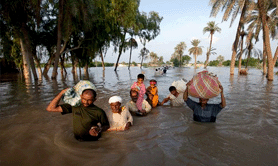Disaster Risk Management
Disasters in the absence of well-defined and integrated risk reduction interventions serve as stumbling block to sustainable development. In the face of several devastating natural calamities during the last one decade, Pakistan has faced a serious social and economic set-back to the national development targets pertaining to key sectors of economy, including agriculture, infrastructure, housing, health, and education.
Therefore, Disaster Risk Reduction is among the core programme areas of I-SAPS whereby various initiatives for policy improvement, institutional strengthening, transparency in financial flows, and improvement in disaster risk management are being implemented in line with the overarching framework of the National Disaster Risk Reduction Policy, 2013 and National Disaster Management Act, 2010.
Our programme team’s in-depth understanding of national policies and their relevance as reference points for reforms places us in an advantageous position to synthesise diverse sources of information to produce knowledge that has strategic value.
The scope of I-SAPS activities ranges from filling in the knowledge gaps by contributing evidence and knowledge on the efficacy and dynamics of existing disaster risk management framework in Pakistan to engaging the policy community, including politicians, civil society organisations and civil administration, with a proactive and anticipatory approach, which lays special emphasis on risk assessment, prevention, mitigation and preparedness. As the knock-on effect of these initiatives, I-SAPS aims to initiate a far-reaching dialogue by engaging the civil society, academics and media to help create disaster resilient communities by strengthening disaster planning and implementation at the grassroots.



